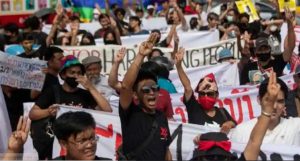Social movements have been taking place across the globe for as long as we can remember but through technological expansions and increased interconnectedness, these manifestations for social change have become increasingly visible, especially on social media.
Since the beginning of the 20th century, Thailand has had over 13 military coups. People have been living under a military dictatorship where freedom of speech has been limited and population control has been strictly enforced. Following the governments’ response to the pandemic, anger and frustration has surged across the nation. With lockdown and curfew restrictions, protesters have taken to the streets, but more importantly, social media, to voice their discontent. In combination with such, large protest gatherings of mostly pro-democracy students have taken place, and strict punishments have been put in place for those who discredit the government or the monarchy. Two interesting examples of social activism are hereby presented.

The #Whatishappeningin hashtag began during the protests in Hong Kong, and has since then been adapted in many countries, including Thailand. #Whatshappeninginthailand has been used broadly to mobilize people and spread international awareness, but more particularly, hashtags have been adapted to individual scenarios, driving social change.
A particular example that really amplifies the impacts of social media, was an incidence that occurred in July. As Thais had been taking to the streets for weeks, a Food Panda driver was photographed amid the protesting crowds. As the company got ahold of the photo, they announced on Twitter that:
“We will expedite the strict implementation of the rules of the company by dismissing the driver from his service immediately. Please note that Foodpanda has a policy against all forms of violence and terrorism. We are willing to fully assist the authorities in prosecuting criminals.”
The hashtag #BanFoodpanda had been used millions of times across the nation in just a few hours, and the company had lost over half of their Thai subscribers. In a panicked attempt to do damage control, the company later posted an apology, but did not stop people or restaurants from leaving the platform. Foodpanda had to disable the “delete my account” function to save themselves.
The governments’ response to protests have been brutal, but particularly interesting has been their attempts to infiltrate and control social media. They have used social media to discredit the movement, threaten students and to censor key media outlets. They have enforced laws which will punish you for spread “fake news” notably anything related to the management of the government, threatening news outlets. Not only has the social media activism helped raise awareness and drive people to act, but influencers and elites have also begun to speak out about the situation.
Influencers from different Southeast Asian countries have posted images of the 3-finger salute, followed by #Whatshappeninginthailand to show their solidarity. An 18-year-old rapper called out the government in her songs and on her Instagram and was later charged for spreading false information. The hashtag #SaveMilli was used over 1.3 million times, and she was later released with a 2,000 THB (60 USD) fine.

It is no secret that despite protests and social outrage, little to nothing has changed throughout the years. Many of the protest leaders have been arrested, pending trial. Some have even been sentenced to lifetime.
The point is, social activism has allowed for information to be transmitted so fast that it can cause an entire business to fall to the grounds, but to what extent does it aid in bringing greater social change against an entire government entity?
